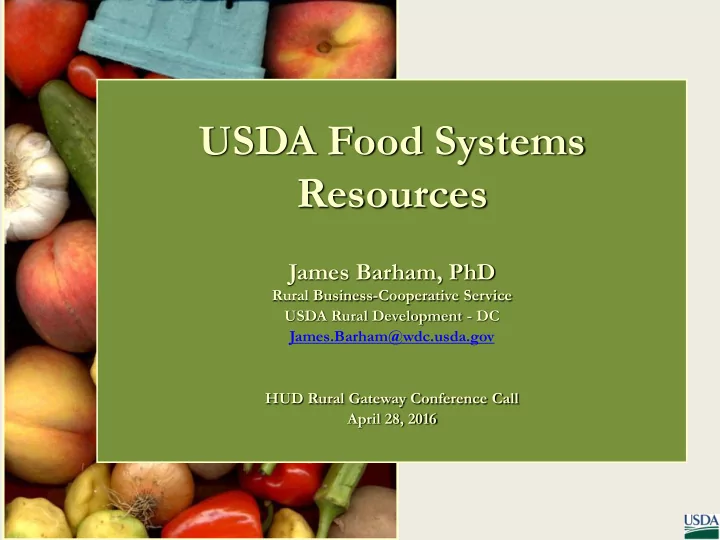

USDA Food Systems Resources James Barham, PhD Rural Business-Cooperative Service USDA Rural Development - DC James.Barham@wdc.usda.gov HUD Rural Gateway Conference Call April 28, 2016
Presentation Overview Local and Regional Food Systems: What is Local Food? Why Do We Care? How to Get Started USDA Resources to Support Local Food Systems Development
What is Local Food? Ways that “Local” has been defined: » Miles » State » County » Region
What is Local Food? A few definitions… USDA • For Rural Development’s Business & Industry Loan Guarantee Program: less than 400 miles from origin, or State, Territory, or Tribal land in which it was produced • USDA Cafeteria: Food grown within 200 miles of DC and/or from farm operations in MD, VA, WV, PA, and DE. Grocery Stores • Wal-Mart: State in which it was produced • Whole Foods: Products that have traveled less than a day (fewer than eight hours). But often less – individual stores can determine proximity. Food Co-op • La Montanita : 300 mile radius from Albuquerque, based on regional foodshed encompassing the Rio Grande River Valley Rift
What is a Local/Regional Food System? And the benefits All phases Take place within a (economic, social, of the lifecycle of food… specific region (county, environmental, state, multi-state area) nutritional) accrue to the local community *Products are marketed as LOCAL so that consumers can choose to support local businesses with their purchase*
Local WHAT? Beans, Meat, Poultry Grains, Vegetables and Fish and Flour Eggs Dairy Fruits
What is a Local Food System? Source: CS Mott Group for Sustainable Food Systems at Michigan State University
Why is USDA Involved? A strategy to meet many goals… Economic development and jobs Education and health in schools Increased access to healthy food Beginning farmer opportunities
USDA’s “ Know Your Farmer, Know Your Food” Initiative Website: One-stop shop for financial and technical assistance resources from USDA to grow your local food enterprise www.usda.gov/knowyourfarmer Mapping Tool: See what’s funded in your community and learn how others are using USDA programs www.usda.gov/kyfcompass www.usda.gov/knowyourfarmer
The Grants, Loans, and Support www.usda.gov/knowyourfarmer
KYF Compass MAP Includes data on: USDA-funded local food projects since 2009 Farmers markets, food hubs, and other “context data” gathered by USDA agencies Projects and resources from 9 other Federal Departments Updated annually www.usda.gov/kyfcompass
USDA and Local/Regional Food Systems Where and How to Start ? Credit for Smaller Farmers High Tunnels (Hoop Houses) Business and Product Development SNAP/EBT at Farmers Markets Mobile Markets Farm to School
USDA and Local/Regional Food Systems Credit Farm Loans, Microloans and Farm Storage Facility Loans USDA’s Farm Service Agency State Offices www.fsa.usda.gov/FSA/StateOffices
USDA and Local/Regional Food Systems Extending the Growing Season Seasonal High Tunnel initiative (hoop houses) USDA’s Natural Resources Conservation Service www.nrcs.usda.gov
USDA and Local/Regional Food Systems Business and Product Development Value-Added Producer Grants Rural Business Development Grants USDA’s Rural Development State Offices www.rurdev.usda.gov/StateOfficeAddresses.html
USDA and Local/Regional Food Systems Financing Food Hubs and Processors USDA’s Local Food Promotion Program www.ams.usda.gov/lfpp
Stage of Business Development - USDA Programs for Food Enterprises - Growth Implementation Local Food Promotion Program Planning Rural Business Specialty Crop Block Development Grants Grants Rural Business Local Food Promotion Value-Added Producer Development Grants Program Grants Local Food Promotion Specialty Crop Block Business and Industry Program Grants Guaranteed Loans Specialty Crop Block Value-Added Producer Community Facilities Grants Grants Loans and Grants Value-Added Producer Farm to School Grants Grants Community Food Small Business Projects Competitive Innovation Research Grants
USDA and Local/Regional Food Systems Mobile Markets USDA’s Farmers Market Promotion Program www.ams.usda.gov/fmpp
USDA and Local/Regional Food Systems SNAP/EBT at Farmers Markets USDA’s Food and Nutrition Service www.fns.usda.gov/snap/ebt/fm.htm
USDA and Local/Regional Food Systems Farm to School Plan and implement new farm to school programs • Farm to School grants Purchase kitchen equipment and cold storage • Specialty Crop Block Grants • Community Facilities grants and loans • Rural Business Development Grants School and community gardens • Specialty Crop Block Grants • Team Nutrition Training Grants USDA’s Farm to School Program www.fns.usda.gov/FarmToSchool
New Report Series on Hubs! USDA Food Hub Technical Report Series Running a Food Hub: Lessons Learned from the Field Running a Food Hub: Business Operations Guide Running a Food Hub: Assessing Financial Viability Electronic copies of these publications can be downloaded for free at www.rd.usda.gov/publications/publications-cooperatives
USDA Co-op Resources Rural Development’s Cooperative Programs www.rd.usda.gov/programs-services/all- programs/cooperative-programs Professional staff conduct research and provide educational trainings, technical assistance, and grant support to co-ops across the country. www.rd.usda.gov
USDA Co-op Resources Library of Co-op Publications www.rd.usda.gov/publications/publications-cooperatives Extensive library of over 150 publications, including Rural Cooperatives magazine, and many “how to” guides like:
Upcoming Training Opportunity! Online Training on Assessing and Financing Regional Food Enterprises Learn how to use this due diligence toolkit to assess food enterprises along nine dimensions, including finances, risk mitigation, marketing and sales, operations, and impact potential. In partnership with Wholesome Wave. Toolkit can be downloaded at: http://www.wholesomewave.org/our- initiatives/nationalnutritionincentivenetwork/p ublic-resources/
Thank You! Jim Barham James.Barham@wdc.usda.gov www.usda.gov/kyfcompass www.usda.gov/knowyourfarmer knowyourfarmer@usda.gov
Recommend
More recommend